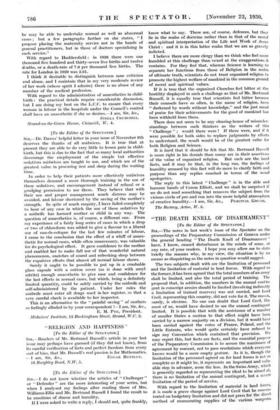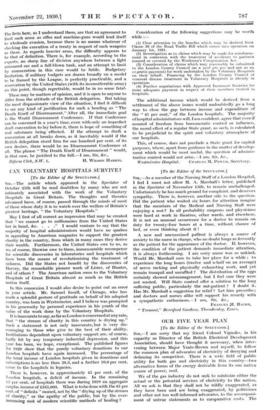"THE DEATH KNELL OF DISARMAMENT".
[To the Editor of the SPEcncroa.] Sm,—The notes in last week's issue of the Spectator on the proceedings of the Preparatory Commission at Geneva under the general heading " The Death Knell of Disarmament have, I know, caused disturbance in the minds of some, at any rate, of your readers. I hope you may allow me to state briefly the reasons why, in my view, the situation is by no means as disquieting as the notes in question would suggest.
The two subjects dealt with are the limitation of personnel and the limitation of material in land forces. With regard to the former, it has been agreed that the total numbers of an army shall be limited, and also the total period of training. The proposal that, in addition, the numbers in the annual contin- gent in conscript armies should be limited (involving indirectly a limitation of trained reserves) was not carried, and Lord Cecil, representing this country, did not vote for it. The reason, surely, is obvious. No one can doubt that Lord Cecil, like most of us, would have desired to see the annual contingent limited. It is possible that with the assistance of a number of smaller States a motion to that effect might have been carried by a narrow majority on a division, but it would have been carried against the votes of France, Poland, and the Little Entente, who would quite certainly have refused to sign any Convention which contained that provision. We may regret this, but facts are facts, and the essential purpose of the Preparatory Commission is to secure the maximum of agreement by consent, not to pass resolutions which everyone knows would be a mere empty gesture. As it is, though the limitation of the personnel agreed on for land forces is not as complete as it might be, it represents an important and valu- able step in advance, none the less. In the Swiss Army, which is generally regarded as representing the ideal to be aimed at, there is no limitation of the annual contingent, but a severe limitation of the period of service.
With regard to the limitation of material in land forces, it is made a grave charge against Lord Cecil that he concen- trated on budgetary limitation and did not press for the direct method of enumerating supplies • of • the various weapons.
The facts here, as I understand them, are that an agreement to limit such arms as rifles and machine-guns would lend itself to wholesale evasion, because there is no means whatever of checking the execution of a treaty in respect of such weapons as these. M regards heavier arms, the difficulty appears to be that of definition. There is, for example, according to the experts, no sharp line of division anywhere between a light amioured car and a full-blown tank, and an attempt to limit by enumeration in this case would be futile. Budgetary limitation, if military budgets are drawn broadly on a model to be framed by the League, is perfectly practicable, and a reservation by the United States (with its inconsiderable army) on this point, though regrettable, would be in no sense fatal.
These may be matters of opinion, and it is open to anyone to differ from the attitude of the British delegation. But taking the most dispassionate view of the situation, I find it difficult to see any kind of justification for such a heading as " The Death Knell of Disarmament." After all, the immediate goal is the World Disarmament Conference. If that Conference can be convened in a year's time, even with only an imperfect draft convention to lay before it, there is hope of something of real substance being effected. If the attempt to draft a convention at all breaks down, as it inevitably would if the British delegation stood firm for one hundred per cent. of its own desires, there would be no Disarmament Conference at all. The phrase " The Death Knell of Disarmament " would, in that case, be justified to the full.—I am, Sir, &c.,



















































































 Previous page
Previous page